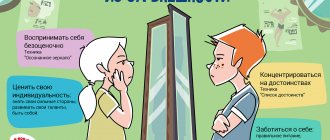Do you know that many people have, so to speak, personal enemies. No, these are not other people, as you might think. We are talking about fear, doubt, self-disrespect, anxiety, etc. In fact, this list can be listed endlessly. Everyone has their own “personal enemy”.
In this article:
Why do they want to eliminate doubt? Doubt as a clue Doubt as an identifier of internal or external problems Support points that help you gain self-confidence Go forward and don’t look back
Why do they want to eliminate doubt?
Photo by Kindel Media: Pexels
In this publication, Samka will tell you how to turn a seemingly enemy, in the face of doubt, into your ally. This may not be much of a surprise to you, because the stated question presupposes complete removal of doubt.
But the more we analyze the question, the more obvious the answer will be to you - you don’t need to get rid of doubt. It is important to make him your assistant.
If you dig deeper into the issue, doubt is a lack of confidence in something. This, in turn, is a kind of brake. A person essentially stands in one place.
And if we take into account that in some cases there is a shortage of time, then doubts can push people to the wrong actions, or to a proven and stable, but not effective option. Look, when analyzing the question, it is important to make specific divisions. A person may doubt:
- to yourself;
- others;
- the correctness of your decisions, choices, actions.
As you understand, from the position under consideration, doubts act as something negative. That is why people try to get rid of them, forgetting one small but very significant detail - doubts are just a consequence, and if you try to remove them without working through the root of the problem, doubts will return again and again.
Dangerous mechanism of action
It is believed that the best advisor and assistant is your own inner voice. The person speaking to him gives the most useful advice. And if a person doesn’t know what to do, if he can’t make a decision, he stops hearing the prompts of consciousness. This is fraught with unpleasant consequences.
note
Human intuition is a powerful mechanism, and neglecting it means depriving yourself of the opportunity to move up the career and social ladder.
Personality and identity
If a person does not do something on his own and is constantly faced with difficult choices, then he constantly asks for advice from others. Of course, there is nothing wrong with seeking someone else's opinion.
But everyone must make key decisions in their lives on their own. But your loved ones and friends are different people with their own life priorities, goals and characters. By constantly listening to their advice, you will live their life and lose your individuality.
Pastime
When doubt arises, he spends his free time soul-searching. Instead of taking a break from a hard day's work, he tries to analyze the motives and consequences of every action, no matter how insignificant. The mood deteriorates, and after work the person actually goes to a second job. In addition, he begins to abandon his favorite hobbies, believing that he achieves nothing in them. An ordinary hobby either turns into a competition, or is carefully analyzed to see whether it is the right thing to do.
Doubt as a clue
As you already understand, most people make mistakes. And this is considered normal. But, do not forget the main thing - the norm until doubts begin to slow down or even “redirect” a person to the wrong path.
You will probably ask what are the clues that so clearly represent doubts. It's very simple - they expose a person's weak points. Let’s conditionally divide them into blocks, where:
- Block No. 1 will be associated with self-doubt and the inability to decide which of the available options should be chosen. This also includes dependence on the opinion of society, like: “What will people think of me?”
How to stop doubting and become confident?
- Block No. 2 involves doubts that give rise to a lack of experience, knowledge, and skills. In essence, a person begins to doubt his own abilities. This is primarily due to cliché thinking.
- Block number 3 is associated with doubting other people. And here we can talk about a mix of: misunderstanding of ourselves, and, accordingly, other people.
Look, it is very important to understand, as they say, where the legs of doubt grow from: these are your personal “fruits”, or other people “shared” doubts with you. What this means is that the close environment can cause a kind of discord—some kind of confusion.
This is due to the fact that by questioning your point of view on a particular situation, or criticizing your decision, others begin to mislead.
And as a natural result, you find yourself in a state of confusion and do not understand how to act correctly. That is why we emphasize that doubts are your clues, and even if you want them, they will be your helpers.
Effective Decision Making Techniques
Descartes square
One of the most effective tactics. You need to draw a square on a notebook sheet and answer all the questions. This allows you to evaluate the problem from all sides and understand the feasibility of one or another intention, as in the photo.
5 Whys
It is necessary to look at the problem and ask yourself the question “why”, for example, why was I fired. The answer is that it didn’t work well. Based on this, the next question is asked: why was I fired? And so repeat 5 iterations. It will allow you to sort out the problem.
Doubts as an identifier of internal or external problems
Above, we discussed in detail that you need to, figuratively speaking, make friends with doubts, and not consider them enemies. Based on this, as you understand, the stated question: “How to stop doubting?” automatically transforms into a new one, and it sounds: “Which particular problem areas reveal doubts?”
As you can see, everything is very simple - you will understand what exactly your doubts point to, and you will be able to figure out the root of the problem. But our task is to help you with this as much as possible. You yourself already realized that there is a non-standard solution in the topic covered.
It is this approach that helps a person understand himself to the maximum. Let's start with the central one, namely, identify your core beliefs. Below will be a list of possible ones; they will either, as they say, hit the bull’s eye, or they will lead you to something specific.
Possible Beliefs
- I can't handle it
- I do not have experience
- I might lose my stability
- I don't know if I love this person or not
- I need a significant other to approve of my decision.
- If I start taking the first steps, I’m afraid that later I won’t understand what I should do next
- I will not be able to adapt to new conditions
- Compared to others, I am less active and active
- My choice can lead to dire consequences
- I can hurt another person
- The outcome of my choices may endanger other people.
- When choosing between two options, I often bet on the losing one.
- I'm a loser
As you understand, this list can be continued endlessly. But the listed beliefs have common links, which were already mentioned above: doubts about yourself and your decisions are a consequence of uncertainty. Moreover, significant people can “dress” this insecurity on you.
What is FOBO
This term was coined by How to Beat FOBO, From the Expert Who Coined It by venture capitalist and writer Patrick McGinnis. He believes that the fear of the best option is an obsessive desire to make not just the optimal, but the most ideal choice of all possible. A person suffering from FOBO understands that there are more or less suitable solutions, but is afraid to stop at them: what if they still turn out to be not good enough and he will experience disappointment.
Sometimes people prone to FOBO are also called Satisficing vs. Maximizing by maximizers. Unlike their opposite - moderates, who weigh different options, find the right one and calmly move on with their lives - maximizers are never satisfied with their choices and are terribly afraid of making a mistake.
Points of reference to help you gain self-confidence
In order to stop doubting yourself and your decisions, you need to find, first of all, points of support. It is they, in conjunction with the awareness of what exactly lies behind the doubts, that will do their job - they will teach, firstly, to understand themselves, and secondly, to no longer doubt the correctness of their own decisions.
Samka suggests dividing your support points into:
- Personal qualities
- Skills
- Achievements
- Positive results
As a rule, when a person is not confident in himself, he focuses attention on his own, so to speak, shortcomings and weaknesses. Samka invites you to gradually shift your focus in several directions at once. When in doubt:
- a) the first thing to do is to realize what is behind them (we have already discussed this point in detail above);
- b) connect the above support points. That is, it is important for you to understand your personal qualities through analysis, understand which skills are best developed, and focus on achievements and positive results.
- c) write down several scenarios for the development of the situation. It is important to describe both positive and not so good results. This way, you kind of prepare a plan of action in case of failure.
Agree, when there are specifics and a plan, it is no longer so alarming, but the most important thing is that the situation takes on quite well-defined features.
Talk to a friend or loved one
A confidential conversation with a friend or long-time friend will help in cases where you are not able to figure out the problem on your own. If you are left alone with yourself in a crisis situation, your thoughts will very quickly take on a negative connotation, and you will be overcome by fear of the future.
A frank conversation with a friend or relative will help overcome self-doubt and get rid of isolation. When you begin to openly share your thoughts, you will soon realize that the problem is far-fetched, the reality is not as terrible as it seems. In addition, words of approval and compliments from loved ones increase confidence.
Go forward and don't look back
Another important factor of doubt is that people really like to live in the past. They are literally immersed in events that have already happened. This is comparable to a quagmire, which, as you yourself understand, is an inhibitory factor. Therefore, Samka emphasizes the importance of moving forward and not looking back. Remember that your past experience is not somewhere out there, behind you, it is with you, in the baggage that you carry.
Summarizing the above, it is important to highlight the key aspects. This is what will help you not fight at windmills in the form of doubts, but will direct internal resources to eliminate the root of the problem.
- Doubts are an identifier of a certain problem. There is no need to fight them; it is important to “listen” to them. Remember that doubts are always a consequence, but never a cause.
- Doubts arise when there are either several options, or life requires changes, and a person, for some reason, is not ready for them. It is important to identify the “weak link” and, based on this, find an acceptable solution.
- Doubts are insurance against risky and rash actions, but only when a person listens to them and does not plunge into a quagmire.
How to overcome fear and self-doubt at work?
A new unfamiliar thing is always scary. Thoughts arise that you won’t cope, and everyone will understand how stupid you really are. Remember that everything you know how to do well now, you also learned once. Read motivational literature, study biographies of people who were able to overcome difficulties on the path to success.
Often in work, people do not see the difference between accepting responsibility and self-blame. The first one motivates, the second one deprives one of strength. As soon as you notice that you are berating yourself, stop. Remind yourself that self-flagellation is not good for you or the cause.
If you're nervous during a business meeting or in your boss's office, influence your emotions through your body: straighten your shoulders, lift your chin, keep your back straight. This will not only create a state of inner confidence, but will also make the right impression on the interlocutor.
Change your mindset to a positive one
Uncertainty and fear of doing something wrong poison life. It is important to understand that these negative feelings begin with thoughts. The perception of the surrounding reality depends on how and what you think about. Therefore, to make yourself better, try to control your thoughts, suppress anxiety with an effort of will, and do not let doubts overcome you.
While clearing your mind of negativity, at the same time form positive thinking. Doing yoga or doing something you love, receiving gratitude, and physical activity increase dopamine production. This substance increases the level of internal motivation. You will be able to better control your thoughts and overcome many fears.
Following the recommendations of psychologists will increase self-esteem and help overcome indecision and fear of communicating with people:
- Read motivational articles and books. Recommended reading: “The Luck Factor” by Richard Wiseman, “A Practical Course in Happiness” by John Kehoe, “Change Your Thinking and You’ll Change Your Life” by Brian Tracy, “Hero” by Rhonda Byrne.
- Listen to your favorite music.
- Surround yourself with optimistic people.
- Every time before you go to bed, write down three positive things that happened during the day.
Write down your thoughts on paper
Not all people have the opportunity to talk to someone about their problems. In this case, you can express thoughts and emotions on paper. Keep a diary, write down everything you feel and worry about. It is advisable to do this daily to develop a habit. In free form, it is recommended to list gratitude for what you already have, write down goals and obstacles that you have to face.
This method will help you clear your mind, establish a connection with yourself, and become aware of your own reactions to current events. By expressing your thoughts on paper every day, you will not allow them to “stagnate” in your consciousness and will not allow them to turn into negative ones. In addition, the diary will help you record and accept different emotional states and restore harmony with the world around you.











